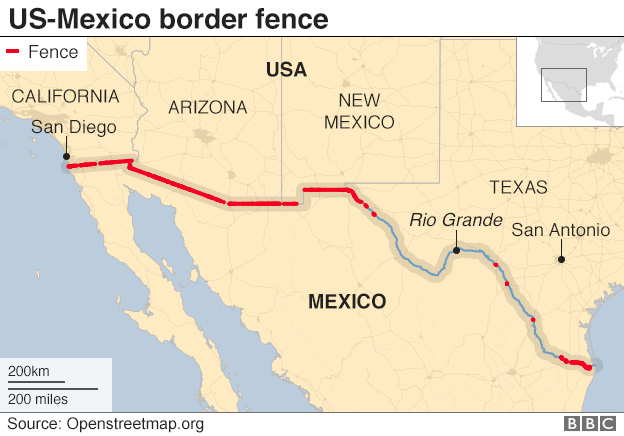Trump Escalate Border Wall 'Crisis' Addresses Nation on TV

US President
Donald Trump has made his first TV address to the nation from the Oval Office,
escalating a stand-off with Congress that has led to an 18-day partial
government shutdown.
Mr Trump
insisted on funding for his long-promised border wall with Mexico.
However, he
did not declare an emergency that would enable him to bypass the lower house of
Congress now controlled by the opposition Democrats.
Democratic
leaders accused him of holding the American people hostage.
The
Republican president wants $5.7bn (£4.5bn) to build a steel barrier, which
would deliver on his signature campaign pledge.
But
Democrats - who recently took control of the House of Representatives - are
adamantly opposed to giving him the funds.
The ongoing
closure of a quarter of federal agencies is the second-longest in history,
leaving hundreds of thousands of government workers unpaid.
In an
eight-minute live address on Tuesday night, he blamed the Democrats for the
government shutdown.
The
situation at the border was, he said, a "humanitarian crisis, a crisis of
the heart and a crisis of the soul".
Mexico, he
said, would pay for the wall through a revamp of the North American Free Trade
Agreement, which is yet to be ratified. Economists have disputed this. Mexico
has never agreed to pay for the wall.
The
president also said that 90% of heroin sold in the US comes from Mexico, though
US government figures make clear all but a small percentage is smuggled through
legal points of entry.
Mr Trump
correctly pointed out that Democrats including Mr Schumer had voted for a
physical barrier to cover 700 miles (1,120km) in 2006.
Mr Trump
also cited cases of American citizens "savagely murdered in cold
blood" by undocumented immigrants.
On Thursday,
he is due to visit the actual border.
House
Speaker Nancy Pelosi and Senate minority leader Chuck Schumer demanded that Mr
Trump end the shutdown.
"The
fact is the women and children at the border are not a security threat, they
are a humanitarian challenge," said Mrs Pelosi.
She accused
President Trump of "holding the American people hostage" and
"manufacturing a crisis".
Mr Schumer
accused Mr Trump of trying to "govern by temper tantrum" and
appealing to "fear, not facts".
Democrats
argue that maintaining existing border fencing, using high-tech tools to scan
vehicles at ports of entry and hiring more personnel would be cheaper and more
effective than a wall.
There were
two audiences for Donald Trump's address to the nation on Tuesday night. The
first was the American public, who polls indicate are generally uninterested in
his border wall proposal, viewing the president as responsible for the
government shutdown.
The other was Republicans in Congress, who Mr Trump needs
to keep in the fold if he is going to get anything out of this extended
political confrontation.
It seems
unlikely that the president said anything that will move the needle with the
public at large. The arguments were familiar - and some have already been
debunked. The president has been saying there's a "crisis" at the
border practically since he first started campaigning for the job.
As for
congressional Republicans, the speech was a demonstration that Mr Trump is
going to use every arrow in his presidential quiver to get his wall.
The
president may have bought himself a bit more time for negotiations. It's just
not clear what good it will do him.
The border
is 1,954 miles long, with about 650 miles of various types of fencing already
in place through California, Arizona, New Mexico and Texas.
Mr Trump
says much of the wall has already been fully renovated or built. Border
authorities say work has begun on building improved security infrastructure,
and money made available has largely been tied to existing barrier designs.
Illegal
border crossings fell from 1.6 million in 2000 to fewer than 400,000 last year,
and research indicates that undocumented immigrants are much less likely to
commit crime than native-born American citizens.
On Friday,
White House press secretary Sarah Sanders said nearly 4,000 known or suspected
terrorists had been caught attempting to enter America illegally, and referred
to the Mexican border as the "most vulnerable point of entry".
White House
adviser Kellyanne Conway said later that Ms Sanders had been referring to US
government figures for 2017, when 3,775 known or suspected terrorists were
prevented from entering America.
A
clarification by the US department for homeland security states that most of
these interceptions occurred at airports while adding, "The number of
terror-watchlisted individuals encountered at our Southern Border has increased
over the last two years.
The exact number is sensitive..."
Only six
immigrants on a federal watch list were stopped on the southern border in the
first half of 2018.
He is backed
by most of his party, although a handful of moderate Republican senators have
called for an end to the shutdown before the border wall issue is resolved.
The sole
Republican among the nine Congress members who represent southern border
districts is, like his Democratic colleagues, opposed to Mr Trump's wall
plan, CBS News reports.
A new
opinion poll suggests just over half of Americans (51%) blame President Trump
for the government shutdown.
However, 77%
of Republicans say they support his refusal to approve a budget without
taxpayer dollars for the US-Mexico border wall, according to the Reuters/Ipsos
poll.
In theory,
it would allow the president to bypass the usual political process, and access
military spending to fund his barrier.
Analysts say
such a declaration may still follow.
But the
president would be accused of usurping Congress's constitutional power of the
purse, and the move would be bogged down in a quagmire of legal challenges.
FROM .bbc.com/news/world-us-canada-

No comments